Embark on a journey of nursing mastery with the med surg ati study guide. This comprehensive resource provides an in-depth exploration of the core concepts, assessment techniques, and nursing interventions essential for medical-surgical nursing practice. Get ready to elevate your knowledge and excel in your ATI exam.
Dive into the intricacies of medical-surgical nursing, from defining its scope to understanding the vital role of the medical-surgical nurse. Explore common medical-surgical conditions, delve into the nursing process, and master assessment techniques to effectively identify patient needs.
Comprehensive Study Plan
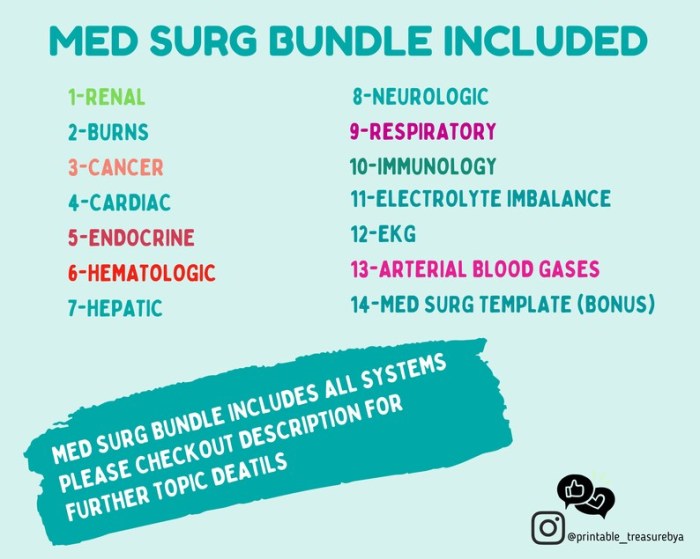
A well-structured study plan is the foundation for successful exam preparation. Begin by organizing your study materials into specific topics, making it easier to focus on each subject area. Establish a study schedule that aligns with your availability and stick to it as closely as possible.
To enhance your learning, incorporate various study methods such as flashcards, practice questions, and reviewing notes.
Organization
Effective organization is crucial for efficient studying. Group your study materials based on topics covered in the exam, such as cardiovascular, respiratory, or gastrointestinal systems. This organization allows you to focus on specific areas and review related concepts together.
Scheduling
Consistency is key when it comes to studying. Create a study schedule that accommodates your availability and stick to it as much as possible. Break down your study time into smaller, manageable chunks to avoid overwhelming yourself. Regular study sessions help retain information better than cramming at the last minute.
Study Methods
Incorporate a variety of study methods to enhance your learning and cater to different learning styles. Utilize flashcards for memorizing key terms and concepts, practice questions to test your understanding, and review notes to reinforce what you have learned. Active recall techniques, such as self-quizzing, can also significantly improve retention.
Core Concepts
Medical-surgical nursing is a specialized field of nursing that focuses on the care of patients with acute or chronic illnesses or injuries. Medical-surgical nurses provide comprehensive care to patients across various healthcare settings, including hospitals, clinics, and rehabilitation centers.
Role of the Medical-Surgical Nurse
Medical-surgical nurses play a crucial role in patient care by:
- Assessing and monitoring patients’ physical and mental health
- Administering medications and treatments
- Providing wound care and other nursing interventions
- Educating patients and their families about their conditions and treatments
- Collaborating with other healthcare professionals to develop and implement patient care plans
Common Medical-Surgical Conditions
Medical-surgical nurses encounter a wide range of medical-surgical conditions, including:
- Cardiovascular diseases, such as heart failure and coronary artery disease
- Respiratory diseases, such as pneumonia and chronic obstructive pulmonary disease (COPD)
- Gastrointestinal disorders, such as peptic ulcer disease and inflammatory bowel disease
- Endocrine disorders, such as diabetes and thyroid disorders
- Musculoskeletal disorders, such as arthritis and fractures
Assessment and Diagnosis
The nursing process is a systematic approach to patient care that includes assessment, diagnosis, planning, implementation, and evaluation. Assessment is the first step in the nursing process and involves collecting data about the patient’s health status.
There are a variety of assessment techniques that nurses can use, including:
- Interviewing the patient
- Performing a physical examination
- Reviewing the patient’s medical record
li>Observing the patient’s behavior
Once the nurse has collected data about the patient’s health status, they can begin to make nursing diagnoses. Nursing diagnoses are statements that describe the patient’s health problems and the related factors that are contributing to those problems.
Common nursing diagnoses related to medical-surgical conditions include:
- Impaired physical mobility
- Impaired skin integrity
- Risk for infection
- Acute pain
- Constipation
Planning and Implementation
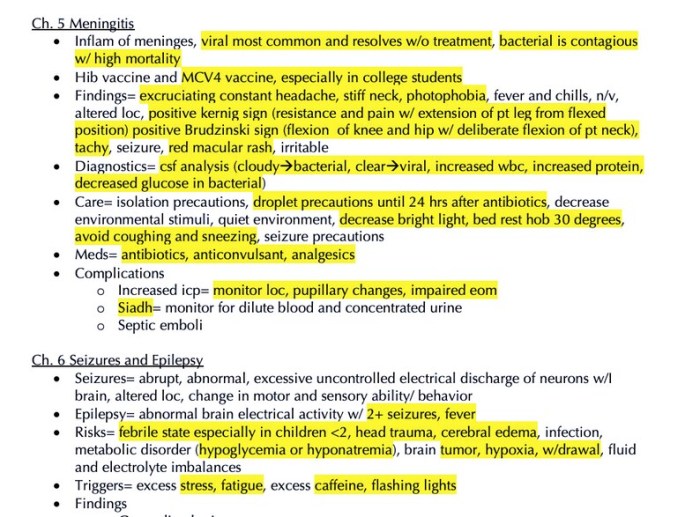
Nursing care planning is the process of developing a tailored plan for each patient to address their unique health needs. It involves assessing the patient’s condition, establishing goals, and selecting and implementing interventions to achieve those goals.
Once a care plan is developed, nurses implement the interventions and monitor the patient’s response. This may involve administering medications, providing wound care, teaching the patient about their condition, or assisting with activities of daily living.
Monitoring Patient Outcomes
Monitoring patient outcomes is an essential part of the nursing process. By regularly assessing the patient’s condition, nurses can identify any changes or complications and adjust the care plan accordingly.
- Nursing care plans provide a roadmap for patient care, ensuring that all aspects of the patient’s health are addressed.
- Effective implementation of nursing interventions is crucial for achieving optimal patient outcomes.
- Regular monitoring of patient outcomes allows nurses to make timely adjustments to the care plan, ensuring the best possible care.
Evaluation and Revision: Med Surg Ati Study Guide
Evaluation and revision are crucial components of the nursing process, ensuring that patient care plans are effective and achieving desired outcomes.
Evaluation involves assessing the effectiveness of nursing interventions and patient progress, while revision entails modifying the care plan based on the evaluation findings.
Evaluate the effectiveness of nursing interventions
- Compare patient outcomes to established goals and expected results.
- Consider patient feedback and satisfaction levels.
- Monitor vital signs, laboratory results, and other objective data.
- Observe patient behavior and response to interventions.
Revise the care plan as needed
Based on the evaluation findings, nurses may need to:
- Modify existing interventions or add new ones.
- Adjust the frequency or duration of interventions.
- Discontinue interventions that are not effective.
- Involve other healthcare professionals or consult with specialists.
Document patient progress and outcomes
Accurate documentation is essential for evaluating and revising care plans. Nurses should record:
- Patient assessments, interventions, and outcomes.
- Any changes or modifications made to the care plan.
- Patient’s response to interventions and progress towards goals.
Medications
Medications are a crucial component of medical-surgical nursing, and nurses play a vital role in their safe and effective administration. Understanding the principles of pharmacology, common medications, and monitoring techniques is essential for providing optimal patient care.
Common Medications Used in Medical-Surgical Nursing
Medical-surgical nurses encounter a wide range of medications, including:
- Antibiotics
- Analgesics
- Antihypertensives
- Antidiabetics
- Anticoagulants
Medication Administration and Monitoring
Medication administration involves the safe and accurate delivery of medications to patients. Nurses must:
- Verify the patient’s identity and medication order.
- Calculate the correct dosage and administer the medication via the prescribed route.
- Monitor patients for adverse reactions and document medication administration.
Principles of Pharmacology
Pharmacology is the study of drugs, their mechanisms of action, and their effects on the body. Understanding pharmacology principles helps nurses:
- Predict medication effects and interactions.
- Adjust dosages based on patient response.
- Educate patients about their medications.
Procedures and Techniques
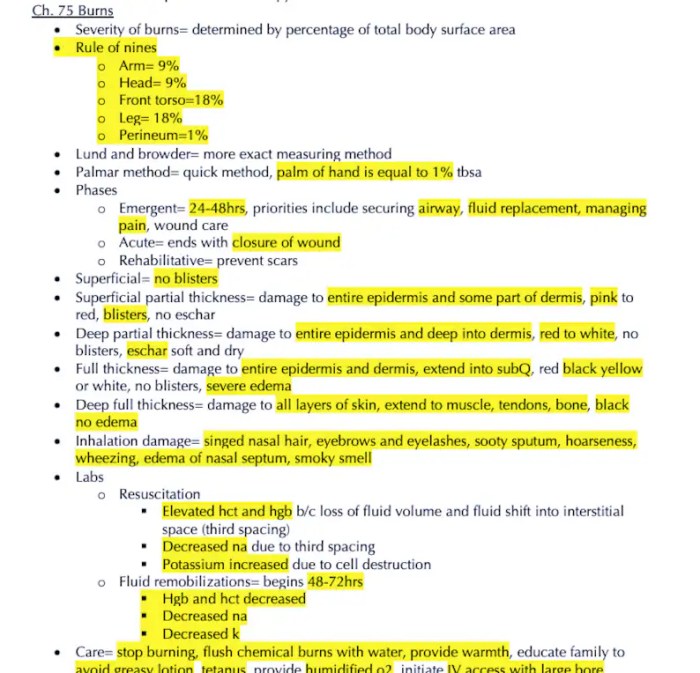
Nursing procedures are essential skills that nurses perform to provide patient care. These procedures include wound care, IV insertion, medication administration, and many others. It is important for nurses to be proficient in these procedures to ensure patient safety and well-being.Aseptic
technique is a set of practices used to prevent the introduction of microorganisms into a sterile field. It is essential for preventing surgical site infections and other complications. Nurses must follow aseptic technique when performing invasive procedures, such as wound care and IV insertion.Patient
safety is a top priority for nurses. Nurses must be aware of potential hazards and take steps to prevent accidents and injuries. Infection control is also important to prevent the spread of infection. Nurses must follow infection control protocols, such as hand hygiene and proper disposal of contaminated materials.
Wound Care
Wound care is the process of cleaning, dressing, and protecting a wound to promote healing. Nurses must assess the wound, clean it with sterile saline or another appropriate solution, and apply a dressing to protect it from infection. Nurses must also monitor the wound for signs of infection and change the dressing as needed.
IV Insertion
IV insertion is the process of inserting a needle into a vein to administer fluids or medications. Nurses must assess the patient’s veins, select the appropriate needle size, and insert the needle into the vein. Nurses must also monitor the IV site for signs of infection and infiltration.
Medication Administration
Medication administration is the process of giving a patient a medication. Nurses must assess the patient’s medication orders, calculate the correct dosage, and administer the medication according to the prescribed route. Nurses must also monitor the patient for adverse reactions to medication.
Communication and Collaboration
Effective communication and collaboration are crucial for providing high-quality patient care. It involves effectively conveying information to patients, families, and other healthcare professionals, working together to develop and implement comprehensive care plans, and accurately documenting patient information.
Communicating Effectively
Open and clear communication fosters trust and understanding. Active listening, empathy, and using appropriate language are essential. Healthcare professionals should tailor their communication to the patient’s needs, considering cultural, linguistic, and cognitive factors. Effective communication promotes patient engagement, satisfaction, and adherence to treatment plans.
In the midst of your med surg ati study guide prep, it’s crucial to understand cirrhosis. If you’re wondering, “Do I have cirrhosis?” check out this insightful quiz: do i have cirrhosis quiz . This resource can help you assess your symptoms and gain a better understanding of this condition.
As you continue your med surg ati study guide, remember to prioritize topics related to cirrhosis to enhance your knowledge and preparation.
Collaborating with Other Disciplines
Collaboration among different healthcare disciplines ensures a comprehensive approach to patient care. By sharing knowledge, skills, and perspectives, healthcare professionals can develop and implement individualized care plans that address the patient’s physical, psychological, and social needs. Effective collaboration requires open communication, mutual respect, and a shared goal of providing the best possible care.
Documenting Patient Information, Med surg ati study guide
Accurate and thorough documentation is essential for effective communication and collaboration. Healthcare professionals must document patient information in a timely, complete, and objective manner. This includes recording patient history, physical examination findings, assessment data, interventions, and patient responses. Accurate documentation ensures continuity of care, facilitates communication among healthcare providers, and protects the patient’s legal rights.
Critical Thinking and Problem Solving
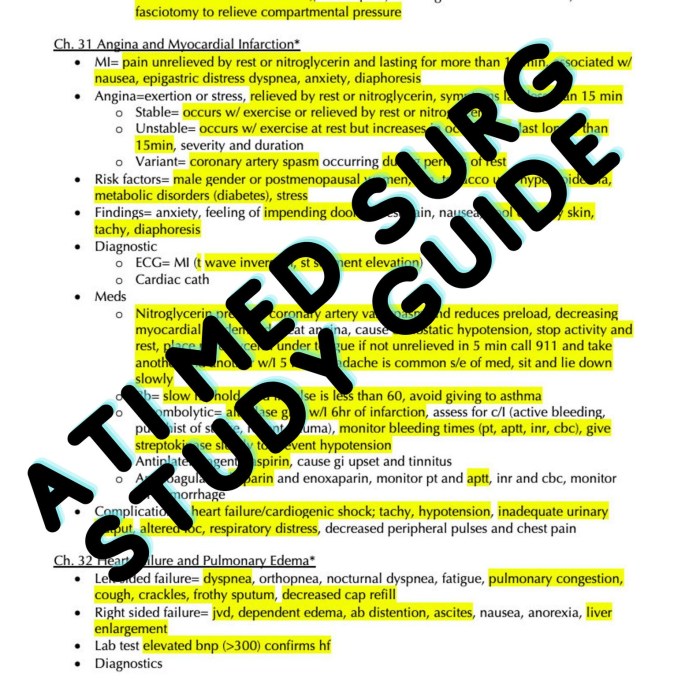
Critical thinking and problem-solving are essential skills for nurses in providing safe and effective patient care. Nurses must be able to analyze patient data, identify potential problems, and develop and implement solutions.
Apply Critical Thinking Skills to Patient Care Situations
Nurses use critical thinking skills to assess patients, identify problems, and make decisions about care. This involves gathering and interpreting data, identifying patterns, and generating and evaluating solutions.
Cultural Considerations
Culture significantly influences individuals’ health beliefs, practices, and experiences of illness. Healthcare professionals must provide culturally competent care to ensure equitable and effective healthcare outcomes.
Impact of Culture on Health and Illness
Culture shapes individuals’ perceptions of health, illness, and appropriate treatment approaches. It influences beliefs about disease etiology, symptom expression, and acceptable coping mechanisms. Understanding these cultural variations is crucial for effective communication and care planning.
Providing Culturally Competent Care
Culturally competent care involves recognizing and respecting the cultural values, beliefs, and practices of patients. Healthcare professionals should:
- Develop cultural awareness and sensitivity through education and training.
- Communicate effectively with patients by using appropriate language and respecting cultural communication norms.
- Involve family members and community resources to support patient care.
- Tailor care plans to align with cultural preferences and values.
Respecting Patient Values and Beliefs
Respecting patient values and beliefs is essential for building trust and fostering a positive healthcare experience. Healthcare professionals should:
- Listen attentively to patients’ concerns and perspectives.
- Avoid making assumptions or judgments based on cultural differences.
- Support patients’ decisions about their care, even if they differ from the healthcare professional’s own beliefs.
- Advocate for patients’ rights and access to culturally appropriate care.
Test-Taking Strategies
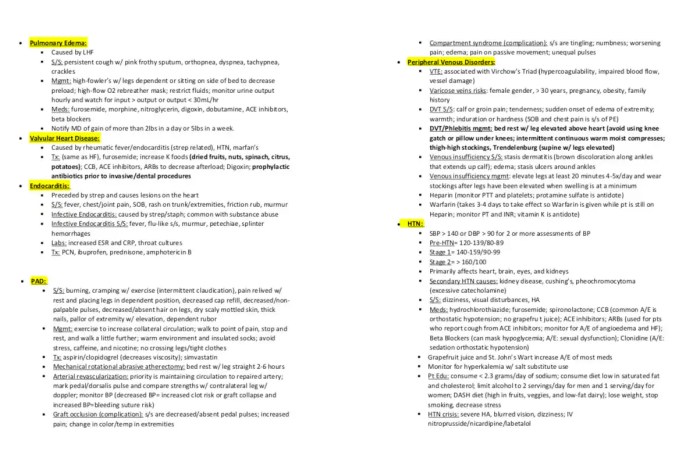
ATI exams test your knowledge and critical thinking skills in medical-surgical nursing. To succeed, it’s crucial to develop effective test-taking strategies.
Common Question Types
ATI exams feature various question types, including:
-
-*Multiple-choice
Select the best answer from several options.
-*True/False
Determine if a statement is true or false.
-*Fill-in-the-blank
Complete a sentence or phrase with the correct answer.
Answering Strategies
Multiple-Choice:
- Read the question and answer choices carefully.
- Eliminate obviously incorrect answers.
- Consider the context of the question and your knowledge of the topic.
- If unsure, make an educated guess based on the available information.
True/False:
- Read the statement thoroughly and determine its accuracy.
- If true, identify the supporting evidence.
- If false, identify the incorrect information and why it is incorrect.
Fill-in-the-Blank:
- Read the sentence carefully and identify the missing information.
- Recall relevant knowledge or use clues from the context to fill in the blank.
- Check your answer for accuracy and completeness.
Practice Exams
Practice exams are essential for familiarizing yourself with the ATI exam format and testing your knowledge.
- Take practice exams under timed conditions to simulate the real exam.
- Review your answers and identify areas where you need improvement.
- Seek help from instructors or tutors if needed.
Essential FAQs
What is the purpose of the med surg ati study guide?
To provide a comprehensive and structured resource for nursing students preparing for the ATI exam and to enhance their knowledge and skills in medical-surgical nursing.
What topics are covered in the study guide?
Core concepts of medical-surgical nursing, assessment and diagnosis, planning and implementation, evaluation and revision, medications, procedures and techniques, communication and collaboration, critical thinking and problem-solving, cultural considerations, and test-taking strategies.
How can I use the study guide effectively?
Follow the comprehensive study plan, organize materials, create a study schedule, and utilize various study methods. Engage with the interactive content, practice questions, and simulations to reinforce your understanding.